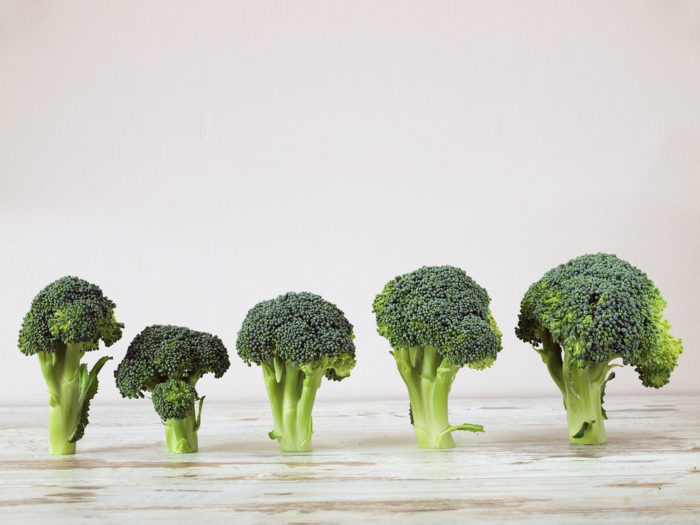
The little trees that can fight free radicals and protect the small intestines
August 9th, 2023Often referred to as little trees, the vegetable broccoli has made the health headlines. New research published in the journal, ‘Laboratory Investigation’ has revealed that broccoli can safeguard the small intestine lining. Scientists have shown that a molecule in the tree-like superfood interacts with the lining of the small intestines and prevents disease progression in mice and potentially humans.
The superfood broccoli
The molecule in broccoli, ‘aryl hydrocarbon receptor ligands’, binds to a protein in the body called AHR. It leads to activities that affect the functions of the intestinal cells. The molecules can counteract the damaging effects of free radicals or other unstable molecules in the body. Scientists have found that broccoli protects the gut and can stave off disease.
In the study, some mice were fed a diet consisting of 15% broccoli, equivalent to 3.5 cups per day for humans. The other mice consumed a typical lab diet. The mice not fed broccoli lacked AHR activity which altered the intestinal barrier function and their gut health was compromised in a variety of ways associated with disease.
The co-author of the research, Gary Perdew is from Penn State University in the US. About the findings of the study, he explains, “Our research is helping to uncover the mechanisms for how broccoli and other foods benefit health in mice and likely humans as well.”
Free radicals have a close link to disease
Free radicals have a close link to disease and health conditions such as heart disease, cancer, arthritis, strokes, respiratory diseases, diabetes, immune deficiency, emphysema and Parkinson’s. Whilst the molecules in superfoods such as broccoli can counteract some of the damaging effects of free radicals, they are not a cure-all food. To help battle or prevent diseases effectively, one has to eat a super diet, not just individual superfoods and lead a healthy lifestyle.
Superfoods
Most superfoods are plant-based. They are ultra-healthy with abundant nutrients and antioxidants. A recent review revealed that 75% of people don’t eat enough fruit, and 85% of people don’t eat enough vegetables.
The cost of fresh fruit and vegetables can be off-putting. In some cases, those superfoods can be cheaper when purchased as frozen, dried or tinned.
Dietitians Tammy Lakatos Shames and Lyssie Lakatos, authors of the ‘Nutrition Twins’ Veggie Cure, explain how people tend to view fresh produce. “We live by them and swear by them. Frozen and some canned foods are often just as healthy as fresh, if not healthier.”
Move over those tubs of ice cream, french fries and juicy burgers, it’s time to make space in your freezer for frozen fruit and vegetables
As soon as fruit and vegetables are harvested, they start to decompose whilst they sit in containers in vehicles. They rapidly lose their nutritional value, spinach, for example, loses 75% of its valuable vitamin C within 7 days. Technology now allows fruit and vegetables to be flash-frozen and processed on-site, sealing in the goodness straight away.
Indeed, some frozen fruit and vegetables don’t taste as nice as the fresh alternative, however, it’s worth trying different brands of frozen superfoods because they do differ somewhat.
Eating a mix of fresh, frozen, dried and tinned fruit and vegetables is important because each source contains some different compounds that are beneficial to the body in different ways.
Are you eating enough superfoods? Are you getting your 5 portions a day of fruit and vegetables? Here’s a list of some superfoods to pop into your shopping trolley.
- Broccoli, spinach, cabbage, brussel sprouts, red cabbage, sweet potatoes, pumpkin, avocados, carrots, kale, garlic, ginger, turmeric, oregano, beans, beet, spirulina, cumin, mushrooms, edamame and kimchi
- Tomatoes, blueberries, papaya, grapefruit, watermelon, red grapes, pomegranates, acai berries, goji berries, raspberries and cranberries
- Almonds, walnuts, brazil nuts, wheat grass, barley, oats, flax seed, sunflower seeds, cloves, quinoa, lentils, soy and tofu
Other super nutritional foods that should end up in your shopping trolley are extra virgin olive oil, yoghurt, green tea, red wine, dark chocolate and dried fruit. Fatty fish and salmon are great sources of fishy nutrition.
Look after yourself
Superfoods can improve immunity and decrease inflammation. You should try to avoid processed foods and limit your consumption of sugar, salt, caffeine and alcohol. Switch to eating more unprocessed foods not only to help prevent or fight disease but to fight other ageing symptoms such as fine lines, wrinkles, ageing spots and dry skin.
Superfoods can also improve the condition of your skin, nails, and hair and increase energy levels as well as help you to maintain a healthy weight.
Do the best for your body by eating a super, well-thought-out healthy diet. Try to incorporate more little trees into your meal planning for good gut health.
#broccoli
What can you do to rid your body of free radicals?
Try ACF228™ it unleashes an effective blend of free radical scavengers to support your body’s natural defences. It is an advanced formula blend that helps to reduce the risk of serious illnesses as well as lessening the impact of aging.
ACF228™ also contains a multivitamin blends of Vitamin B6 and B12 which are essential for any serious longevity regime.
Add this important supplement to your longevity routine, to fight free radicals and combat aging at the same time!
Do you suffer from stomach problems? We recommend our product Stamakort which normalises digestive functions.
https://www.antiaging-systems.com/products/stomach-mucus-peptide-stamakort/
References
https://www.medicalnewstoday.com/articles/303079#common_superfoods
https://www.nhs.uk/live-well/eat-well/5-a-day/portion-sizes/#:~:text=Everyone%20should%20have%20at%20least,fruit%20or%20vegetables%20is%2080g.
https://www.beachbodyondemand.com/blog/why-frozen-and-canned-fruits-veggies-are-good-too





